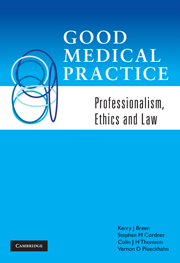Book contents
- Frontmatter
- Foreword
- Contents
- List of tables
- Preface
- Preface to the 1997 edition
- Acknowledgments
- About the authors
- Table of cases
- Table of statutes
- 1 Ethical principles for the medical profession
- 2 Ethical and legal responsibilities of medical students
- 3 Communication skills
- 4 Consent and informed decision making
- 5 Confidentiality, privacy and disclosure
- 6 Medical records, reports and certificates
- 7 Negligence, professional liability and adverse events
- 8 The regulation of the medical profession
- 9 Health care complaints systems
- 10 The doctor and sexual boundaries
- 11 Personal health of the doctor: illness and impairment
- 12 Maintenance of professional competence
- 13 Ethics and the allocation of health-care resources
- 14 The Australian health-care system
- 15 The doctor and interprofessional relationships
- 16 Entering and leaving practice and practice management
- 17 Clinical research
- 18 Prescribing and administering drugs
- 19 Diagnosing and certifying death and the role of the coroner
- 20 Births, reproductive technology, family law and child protection
- 21 Termination of pregnancy and related issues
- 22 Withholding or withdrawing treatment in the seriously or terminally ill
- 23 The law and the mentally ill
- 24 The law and courts of law in Australia
- 25 Medico-legal examinations and reports, court procedures and expert evidence
- 26 Other legislation relevant to medical practice
- APPENDIX 1 AMA CODE OF ETHICS – 2004
- Index
- References
4 - Consent and informed decision making
- Frontmatter
- Foreword
- Contents
- List of tables
- Preface
- Preface to the 1997 edition
- Acknowledgments
- About the authors
- Table of cases
- Table of statutes
- 1 Ethical principles for the medical profession
- 2 Ethical and legal responsibilities of medical students
- 3 Communication skills
- 4 Consent and informed decision making
- 5 Confidentiality, privacy and disclosure
- 6 Medical records, reports and certificates
- 7 Negligence, professional liability and adverse events
- 8 The regulation of the medical profession
- 9 Health care complaints systems
- 10 The doctor and sexual boundaries
- 11 Personal health of the doctor: illness and impairment
- 12 Maintenance of professional competence
- 13 Ethics and the allocation of health-care resources
- 14 The Australian health-care system
- 15 The doctor and interprofessional relationships
- 16 Entering and leaving practice and practice management
- 17 Clinical research
- 18 Prescribing and administering drugs
- 19 Diagnosing and certifying death and the role of the coroner
- 20 Births, reproductive technology, family law and child protection
- 21 Termination of pregnancy and related issues
- 22 Withholding or withdrawing treatment in the seriously or terminally ill
- 23 The law and the mentally ill
- 24 The law and courts of law in Australia
- 25 Medico-legal examinations and reports, court procedures and expert evidence
- 26 Other legislation relevant to medical practice
- APPENDIX 1 AMA CODE OF ETHICS – 2004
- Index
- References
Summary
There are ethical and legal reasons why doctors must adequately inform patients about proposed treatments or procedures, especially in regard to risks and dangers, and be satisfied that patients understand and consent to such measures. Ethically, this arises principally out of respect for the autonomy of the patient. The two-way information exchange required in order to bring patients to a position from which they can provide meaningful consent (an exchange referred to as ‘shared decision making’) is an essential component of good medical practice. Doctors who fail to adequately inform their patients about their condition, treatment options or material risks of treatment may be sued on the grounds of negligence (see Chapter 7). Exceptions to the requirement for consent are uncommon but include genuine emergencies and situations where treatment has been authorised by a court. In addition, if a doctor undertakes any procedure that involves touching the patient without consent, the doctor is guilty of an assault or, more precisely in legal terms, a battery, and an action in trespass may be brought against the doctor in a civil or a criminal court.
Just as there are both ethical and legal reasons for seeking informed consent, so too there are ethical and legal paths to understanding the principles involved in seeking informed consent. The legal pathway involves a detailed appreciation of what the courts in Australia and elsewhere have said about consent.
- Type
- Chapter
- Information
- Good Medical PracticeProfessionalism, Ethics and Law, pp. 49 - 68Publisher: Cambridge University PressPrint publication year: 2010

